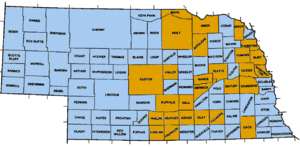County government in Nebraska facts for kids
In Nebraska, a "county government" helps manage local areas. Think of it as a team that runs important services for people living in a county. These services include things like keeping roads safe, managing local elections, and keeping official records. Nebraska has 93 counties, and each one has a government that works in one of two main ways.
Contents
How Counties are Governed in Nebraska
In Nebraska, counties are organized in two different ways. This means they have slightly different setups for how their local government works.
Two Ways Counties are Organized
- Township Counties: In these counties, the land is divided into smaller sections called "townships." Each township has its own local group of leaders. The county itself is then governed by a team of seven people called the Board of Supervisors. About 27 counties in Nebraska use this system.
- Commissioner Counties: These counties are not divided into smaller townships. Instead, they are directly managed by a team called the Board of Commissioners. This board can have three, five, or seven members. Most counties in Nebraska, about 66 of them, use this system.
Who Works in County Government?
Many important people are elected by the citizens to work in the county government. These officials help make sure everything runs smoothly.
Elected County Officials
- Board of Commissioners or Board of Supervisors: These are the main groups of leaders who make decisions for the county. They decide on local laws, budgets, and services.
- County Assessor: This person's job is to figure out the value of land and buildings in the county. This value helps decide how much property tax people need to pay.
- County Attorney: This is the county's lawyer. They give legal advice to the county government and represent the county in court. They also prosecute crimes that happen in the county.
- County Clerk: The clerk is like the county's main record-keeper. They handle important documents, manage elections, and keep official records of county meetings.
- County Sheriff: The sheriff is the chief law enforcement officer for the county. They work to keep people safe, investigate crimes, and manage the county jail.
- County Treasurer: This person is in charge of all the county's money. They collect taxes, manage funds, and pay the county's bills.
- Register of Deeds: This official keeps records of all property ownership changes and other important documents related to land in the county.
Some other county officials, like the county surveyor (who measures land) or election commissioners (who help run elections), might be appointed instead of elected. In smaller counties, one person might even do jobs for more than one county!


